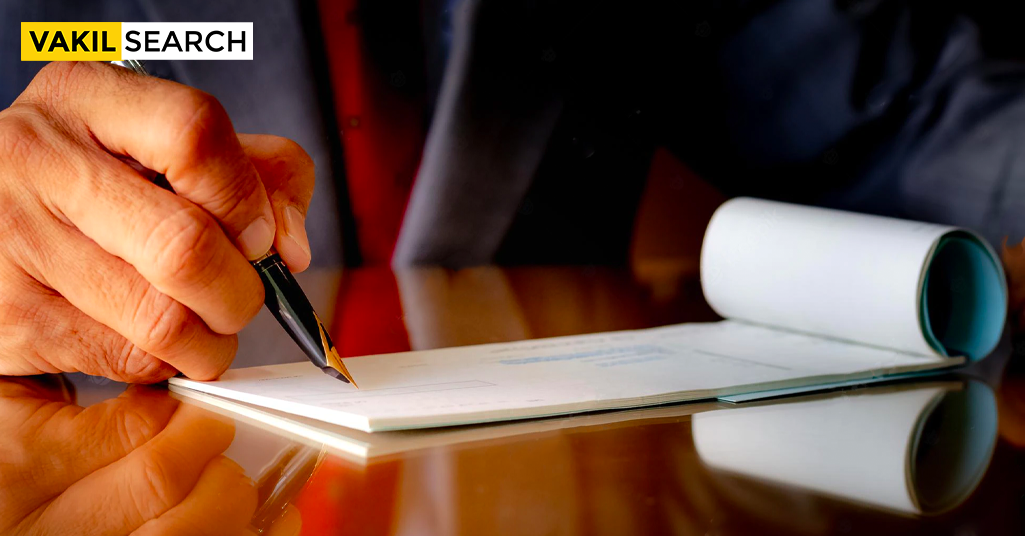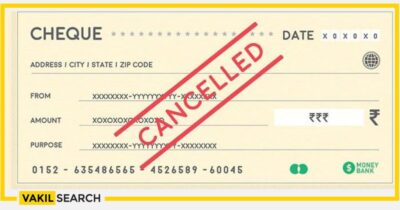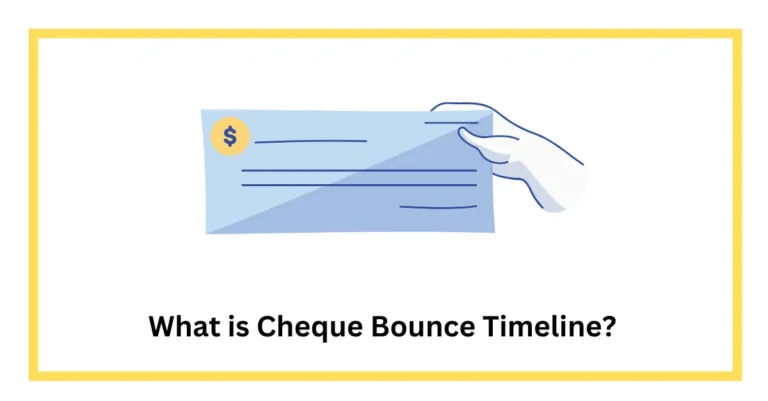Learn more about the legalality of dishonoured cheques, promissory notes, and bills of exchange. Understand consequences, and the notification process for the same
Dishonour of a Cheque From a Legal Perspective
The dishonour of a cheque occurs when the bank declines to disburse the cheque amount to the payee, typically citing reasons such as insufficient funds. As per Section 6 of the Negotiable Instruments Act of 1881, a cheque is defined as a bill of exchange drawn on a designated banker and explicitly made payable on demand.
When a cheque is dishonoured, the drawee bank immediately notifies the payee’s bank with a Cheque Return Memo that details the precise reasons why the cheque was dishonoured. The specific definition of the offence is given in the marginal note of Section 138 of the Negotiable Instruments Act of 1881. It concerns the dishonouring of cheques because there is not enough money or other problems with the account.
Kinds of Dishonour
Dishonour is of 2 kinds
Dishonour of Cheque or Bill of Exchange by Non-acceptance
According to Section 42 of the Bills of Exchange Act, 1882 a bill that is duly offered for acceptance when not accepted within the allotted time frame is deemed dishonoured by non-acceptance and is equivalent to a bounced cheque.
The drawee is deemed to have dishonoured a bill of exchange by refusing to accept it when they are duly obliged to do so, or when presentment is excused and the bill is not accepted.
Dishonour of Cheque, Promissory Note, Bill of Exchange or Cheque by Non-payment
In instances where the drawee or other non-partner drawees fail to fulfil their legal payment obligations, the bill of exchange is deemed dishonoured by non-payment. Similarly, when the maker of a promissory note, the acceptor of a bill, or the drawee of a check neglects their obligation to make the requisite payment, the promissory note, bill of exchange, or check is considered dishonoured by non-payment.
As stipulated by the Negotiable Instruments Act, 1882 in the event of dishonour due to non-payment of a promissory note, bill of exchange, or cheque, the holder or any remaining accountable party is mandated to provide notification of the dishonoured document.
Different Types of Cheques
There are majorly 6 different types of cheque, and they are as follows:
Bearer Cheque
A bearer cheque allows the holder to withdraw the specified amount, provided it is duly signed. It is considered risky, as misplacement can lead to potential loss of the cheque amount.
Crossed Cheque
A bearer cheque is converted to a crossing cheque by adding two parallel lines to the upper left corner. The amount to be transferred to the account can only be accessed by the named individual on the cheque.
Self Cheque
It features the account holder’s name, enabling them to encash money physically at the branch where the account is held.
Post-Dated Cheque
These are cheques that are issued with a future date and are valid for three months from the date of issuance. They are primarily used for business transactions or making payments on a specified future date.
Banker’s Cheque
This cheque is provided directly by the bank, serving as a payment guarantee.
Traveler’s Cheque
This serves as a safe substitute for carrying big amounts of cash because it permits cash withdrawals while travelling. It can be encashed abroad where foreign currency is generally accepted, providing a safe means of travel.
Consequences of Wrongful Dishonour of Cheque
Penalty for Both Drawer and Payee
In the aftermath of a bounced cheque, both the drawer (issuer) and the payee (recipient) face penalties imposed by their respective banks. Additionally, if the dishonoured cheque pertains to a loan repayment, late payment charges are levied. This creates a financial burden for both parties involved.
Credit History Damage
The repercussions extend beyond immediate financial penalties. Dishonoured cheques adversely impact the credit history of the drawer. Financial institutions report such payment irregularities to credit bureaus, negatively influencing the individual’s credit score. A tarnished credit history can impede the ability to secure loans or credit in the future.
Essential for an Action Under Section 138
Section 138 of the Negotiable Instrument Act of 1881 establishes a statutory offence for dishonouring cheques due to insufficient funds in the account that the person maintains with the banker, provided that the amount exceeds the amount agreed upon in an agreement with the bank as specified by the Act.
As per the law, it is always a criminal offence when a cheque for the discharge of a legally enforceable debt or other liability is dishonoured by the bank due to a lack of funds and the drawer refuses to pay despite receiving a legal notice of demand. Although the Act views dishonouring a cheque as a criminal offence, it does so in a concise manner to uphold a civil right.
Case Study
MSR Leathers v. S. Palaniappan and Anrs (2012), a landmark judgement established crucial precedents for offences under Section 138. The case outlined three essential conditions that must be met to constitute a valid offence.
The judgement emphasised the temporal aspect, stipulating that a cheque must be presented to the bank within six months from its issuance or within the period of its validity, whichever is earlier. Notably, a significant shift occurred in the validity period, reduced to three months by the 2011 Reserve Bank of India’s notification.
The second condition highlighted the importance of formal demand. The payee or holder must formally demand payment by issuing a written notice. This notice should be presented to the drawer within thirty days of receiving information from the bank regarding the dishonour of the cheque.
The final condition underscored the drawee’s failure to make payment within the due course of fifteen days from receiving the notice. In essence, MSR Leathers v. S. Palaniappan and Anrs (2012) established a comprehensive framework for determining offences under Section 138, providing clarity on temporal constraints, formal demands, and the subsequent window for rectification.
Circumstances in Which a Banker Is Justified in Dishonouring Customer’s Cheque
Revocation Of Payment By The Drawer
When the issuer of a cheque countermands the payment, instructing the bank not to proceed with the transaction, it constitutes a revocation of payment. Upon receipt of a valid stop payment order, the cheque is obligated to be returned unpaid, accompanied by the notation ‘payment countermanded by drawer.’
Notification Of Drawer’s Deceased
Upon confirmation of the account holder’s demise, cheques bearing their signature are to be returned unpaid, indicating the reason as ‘Drawer deceased.’
Reporting Customer’s Mental Incapacity
If a recognised medical professional certifies the account holder as mentally incapacitated, cheques bearing their signature are to be rejected and returned unpaid.
Acknowledgement Of Customer’s Insolvency
In the case of a customer being declared insolvent, the bank is obligated to refuse payment for cheques drawn by the customer.
Company Liquidation
All Cheques made out by the company must be returned unpaid after receiving formal notification from the liquidation in compliance with the Companies Act,2013 directing the payment of the remaining amount to the liquidator’s account.
Liability of a Drawer of a Dishonoured Cheque
Civil Responsibility
In the event of a dishonoured cheque, the legal standing of the cheque’s drawer transforms into that of a principal debtor to the holder. This designation empowers the holder to initiate a civil suit, akin to any creditor, to recover the owed amount from the drawer, establishing the drawer’s liability as the principal debtor.
Criminal Accountability
The act of dishonouring a cheque due to insufficient funds triggers criminal repercussions for the drawer. Drawing on the provisions outlined in Sections 138 to 142 of the Negotiable Instruments Act of 1881, the drawer is deemed to have committed a criminal offense. These legal sections specifically address the criminal liability of a drawer in cases of dishonoured cheques, outlining the legal consequences of such actions.
Bouncing or Dishonor of Cheque
Nature of the Liability
If a Cheque issued by the drawer is dishonoured due to insufficiency of funds, the drawer is punishable with
- Imprisonment of 2 years, or
- Fine, two times the amount of the cheque, or
- Both.
Condition for Attracting the Liability U/S 138
The Liability u/s 138 arises only if the drawer had issued the cheque to discharge a legally enforceable debt or other liability. Thus, Where the drawer issues a cheque as a gift or otherwise, he is not liable for punishment under section 138 even if the cheque is dishonoured.
The Presumption in Favour of the Holder
It shall be preassumed that the holder of a cheque received the cheque in whole or in part, of any debt or other liability. Thus, The burden to prove that the cheque in a particular case was not given to discharge a legally enforceable debt or liability, lies with the drawer.
Dishonour Due to Insufficiency of Funds
The Cheque must have been dishonoured due to an insufficiency of funds in the account of the drawer.
Presentment of Cheque Within the Valid Period
The cheque must have been presented for payment to the bank:
- Within 3 months from the date on which it was drawn
- Within the period of validity, whichever is earlier.
Notice to the Drawer
The Payee/Holder must give notice to the drawer of the cheque. The notice must fulfil the following conditions:
- It must be in writing
- It must be given within 30 days of receipt of information of dishonour of cheque from the bank
- The notice must require the drawer to make payment of the money due on the cheque, i.e., the payee/ holder must demand the money due under the cheque.
Default in Payment by the Drawer
- The liability u/s 138 is attracted only if, within 15 days of the receipt of notice from the payee/ holder the drawer fails to pay the whole of the money due under the cheque
- If the drawer makes only a part payment, it is considered a default by the drawer. Thus, the cause of the action arises on the 16th day from the day of the receipt of notice from the payee/ Holder.
The Payee/ Holder Must Make a Complaint With the Court
The following points are worth noting in this regard:v0f
- The Complaint must be in writing
- The Complaint must be made within 1 month from the date when the cause of the action arose, i.e., within 1 month from the last date on which the drawer was liable to pay money to the payee/ holder
- The Complaint shall be made with a court of competent jurisdiction.
Conclusion
The Supreme Court of India’s ruling on cheque bounce cases, based on Section 138 of The Negotiable Instrument Act, states that conviction for issuing a bounced cheque can only occur if the issuer had the intention to deceive at the time of issuing the cheque. This ruling clarifies the legal consequences of issuing a bounced cheque and will significantly impact related civil and criminal proceedings. Hope the blog regarding the Supreme Court’s Latest Judgement on Cheque Bounce. If you are dealing with any such issues of cheque bounce, connect with Vakilsearch, our legal advisors will guide you through the process in the comfort of your home.
Frequently Asked Questions
What constitutes the dishonour of a cheque, and under what circumstances can it occur?
Dishonour of a cheque occurs when the issuer's account lacks sufficient funds or if it violates any other terms. It can happen due to insufficient balance, account closure, or a mismatch in signatures, among other reasons.
What legal actions can be taken in case of a dishonoured cheque in India?
In India, legal actions under Section 138 of the Negotiable Instruments Act can be pursued, involving criminal proceedings leading to penalties, imprisonment, or both.
Is there a specific timeframe within which a complaint must be filed in court after the dishonour of a cheque?
Yes, a complaint must be filed within one month of the dishonour. Timely action is crucial for legal recourse under Section 138.
What court has jurisdiction to hear cases related to the dishonour of cheques, and does it vary based on the amount involved?
Cases related to dishonour of cheques are heard by Magistrate Courts, and jurisdiction is determined by the place where the cheque is presented. The amount involved doesn't affect jurisdiction.
What is the procedure for filing a complaint in court for the dishonour of a cheque, and what documents are required?
Filing a complaint involves submitting a legal notice, followed by a formal complaint if not resolved. Required documents include the dishonoured cheque, notice, and evidence of service.
Are there specific court rules or procedures that govern the handling of cases related to dishonoured cheques?
Yes, the Negotiable Instruments Act outlines specific procedures for dishonoured cheques, and legal proceedings are governed by the Code of Criminal Procedure (CrPC).
What remedies are available to the payee or holder of the dishonoured cheque through the court process?
The court process can lead to penalties or imprisonment for the drawer. Additionally, the payee may claim the cheque amount along with interest and legal expenses.
Can criminal proceedings and civil suits be initiated simultaneously for the same dishonoured cheque incident?
Yes, both criminal proceedings under Section 138 and civil suits for recovery can be initiated simultaneously for the same dishonoured cheque incident.
Is there an option for out-of-court settlement in cases of dishonoured cheques, and how does it work?
Yes, an out-of-court settlement is possible through negotiations between the parties. Once agreed upon, the complainant may withdraw the case from the court.
What are the potential penalties or consequences for the drawer of the dishonoured cheque, both in terms of criminal and civil liability?
The drawer can face imprisonment or monetary penalties under criminal liability. In civil liability, they may be required to pay the cheque amount with interest and legal costs to the payee.









